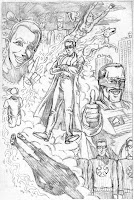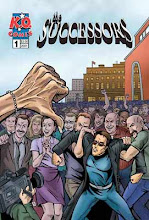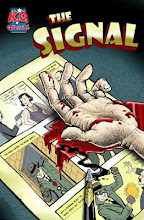Further, watching a show like Heroes, or a movie like the latest hit Push, is frustrating for a lifelong superhero fan like me, because when a power is "introduced" in these worlds, I instantly liken it to a traditional comic book character. For instance, last season in Heroes when Peter's mind was trapped in a super-villain fugitive's body, he struggled to find his host's power and use it against the bad guys around him. When Peter yelled and discovered his sonic scream, I thought, "Oh, so we've been waiting to see Black Canary all this time (or Banshee, if you're a Marvelite)." The big reveal wasn't that big, or revealing, as I've seen the sonic scream done before, and done better. In short, these franchises tend to focus on the logistics of superheroes, like powers and society's acceptance, rather than their respective personalities.
What does this have to do with The Successors? When Brent and I founded K.O. Comix in 2001 (!), we knew we wanted our flagship title to be a superhero series. Around that time, we had read essays by writers Garth Ennis and Warren Ellis denouncing capes and cowls; in retrospect, I understand that their frustration stemmed from being typecast as superhero scribes, but back then we wondered why they'd proverbially toast their own bread and butter. We wanted to create a comic book boldly stating that superheroes are people, too. So, how did we establish a new superhero world, unique from all the others in comics, that emphasized personality over power?
We made our characters choose their fate. Here's the pitch: Ten years ago, superheroes from a parallel universe fell from the sky. Defeated by some cosmic nemesis, they desperately passed their powers to whomever was nearby, then died. Imagine, on your way to work or school, you're literally handed the ability to fly. Do you suddenly decide to stop those pesky bank robbers . . . or become one of them? Maybe you just have an upper hand over traffic from now on. Maybe it's no big deal, like, "Yeah, I can fly. I can run, too, but I usually don't." These are decisions that people make in different capacities every day. Not every Clark Kent would race the train and decide to fight crime. Some would just race the train to get home faster.
 The Superman of our world isn't an ubermensch. He's barely an optimist, and his name is the Optimist (Brent's character design, left). His imagination manifests in a mist from his eyes, like the Green Lantern meets a big cry baby. It's an optical mist . . . Get it?! Like the Man of Steel, he was the first super-powered person to do something good with his new abilities, but he wasn't fond of the role model status that followed. The Optimist, a.k.a. Tyler Moore (whose name was inspired by a certain Mary that can turn the world on with her smile), doesn't hesitate to share why being a superhero stinks, from the stress of the dual identity to the inconvenience of stopping crime in the middle of the work day. Our aim was that his bittersweet realism made him more heroic than anything else and encouraged the other good guys to face the challenges of do-gooding head on. You can still put out a fire with a glass half empty.
The Superman of our world isn't an ubermensch. He's barely an optimist, and his name is the Optimist (Brent's character design, left). His imagination manifests in a mist from his eyes, like the Green Lantern meets a big cry baby. It's an optical mist . . . Get it?! Like the Man of Steel, he was the first super-powered person to do something good with his new abilities, but he wasn't fond of the role model status that followed. The Optimist, a.k.a. Tyler Moore (whose name was inspired by a certain Mary that can turn the world on with her smile), doesn't hesitate to share why being a superhero stinks, from the stress of the dual identity to the inconvenience of stopping crime in the middle of the work day. Our aim was that his bittersweet realism made him more heroic than anything else and encouraged the other good guys to face the challenges of do-gooding head on. You can still put out a fire with a glass half empty.Unfortunately, for every Optimist, there's a Psycho Chick. (Sketched below by me.) Perhaps my favorite creation, when Psycho Chick gets her powers, the only crime-fighting that consumes her involves a crime of passion. She just wants revenge against the boy that hooked up then broke up with her. Her abilities? Emoting. When she's happy, she cries flowers. When she's mad, she spits acid. Now tell me that isn't a more realistic female lead than Wonder Woman or Storm! MySpace-search the chicks in your neighborhood. Now imagine them with superpowers. Case closed.
A different creative direction ended The Successors prematurely, although the third issue starring Citizen Angst was essentially complete, but I'm satisfied that the two available issues accomplish our intentions. Brent designed many of the characters we had plotted to include in this wayward world, and some of them are featured in this never before published pin-up below! (Brent, did you even know I had a copy of this?) I do regret that we never told the story of Crack-up, the wise-cracking superhero that faces tragedy and becomes Crackdown, a gun-toting vigilante. See, when superheroes are people, too, they aren't locked into pre-established paradigms. Spider-man can become the Punisher just as easily as Batman can become the Joker. Regular people do have a superpower -- unpredictability!

Heroes, Push, and other superhero franchises that aren't originally inspired by comic book source material are good at what they do, and even if the emphasis is on government-mandated registration programs or whatever, viewers can't help but project themselves into their heroes' tights, just as the kids from the Golden Age must have, experiencing the likes of Superman and Captain America for the first time. Even if the inquiry isn't asked onscreen, it still stands: "What would I do with superpowers?" Ironically, The Successors sought to ask that question first. Heroes just asked it louder. Curse that sonic scream . . .!






